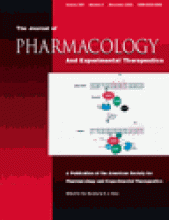Abstract
Muscarinic autoreceptors modulate cholinergic neurotransmission in animals ranging from insects to humans. No previous studies have characterized autoreceptor modulation of acetylcholine (ACh) release in prefrontal cortex of intact mouse. Data obtained from experiments in 45 mice considered ACh as a phenotype and tested the hypothesis that pharmacologically defined M2 receptors modulate ACh release in prefrontal cortex of C57BL/6J mouse. In vivo microdialysis quantified ACh release during delivery of Ringer's (control) or Ringer's containing muscarinic receptor antagonists. The lowest concentration of each antagonist [scopolamine, pirenzepine, or 11-2[(-[(diethylamino)methyl]-1-piperidinyl)-acetyl]-5,11-dihydro-6H-pyrido(2,3-b)(1,4)-benzodiazepine-one (AF-DX116)] that significantly increased ACh release was determined and defined as the minimum ACh-releasing concentration. Dialysis delivery of scopolamine caused a concentration-dependent increase in ACh release, consistent with the existence of muscarinic autoreceptors. The order of potency for causing increased ACh release was scopolamine = AF-DX116 > pirenzepine. Administration of pertussis toxin into prefrontal cortex blocked the AF-DX116-induced increase in ACh release. These findings support the conclusion that M2 receptors modulate ACh release in C57BL/6J mouse prefrontal cortex. Nearly every human gene has a mouse homolog and the appeal of mouse models is reinforced by the identification of mouse genes causing phenotypic deviants. The present data encourage comparative phenotyping of cortical ACh release in additional mouse strains.
Footnotes
-
This work was supported by National Institutes of Health Grants HL65272, HL40881, HL57120, and MH45361 and by the Department of Anesthesiology, University of Michigan.
- Abbreviations:
- ACh
- acetylcholine
- AF-DX116
- 11-2[(-[(diethylamino)methyl]-1-piperidinyl)-acetyl]-5,11-dihydro-6H-pyrido(2,3-b)(1,4)-benzodiazepine-one
- B6
- C57BL/6J
- HPLC/EC
- high performance liquid chromatography with electrochemical detection
- mAChR
- muscarinic cholinergic receptor
- PTX
- pertussis toxin
- TTX
- tetrodotoxin
- Received July 12, 2001.
- Accepted September 6, 2001.
- The American Society for Pharmacology and Experimental Therapeutics
JPET articles become freely available 12 months after publication, and remain freely available for 5 years.Non-open access articles that fall outside this five year window are available only to institutional subscribers and current ASPET members, or through the article purchase feature at the bottom of the page.
|






